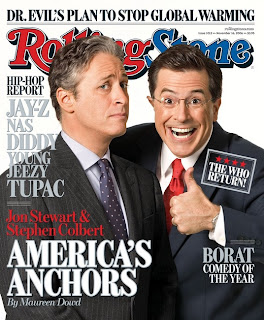There's something hauntingly succinct about stick figures. Their simplicity of form can be manipulated to portray an extremely wide variety of human experiences through subtle altercations that only a true master of form could grace with their touch. If it's not that, their lack of expression can serve in stark contrast to the emotive powers of the dialogue and create an extreme disconnect, just as poignant. In Pictures For Sad Children, a webcomic by John Campbell, we see simplicity taken to an almost absurd extreme, but that somehow seems to capture perfectly the frustrated voices and weariness of an entire generation.
Although it is filled with cryptic apparent randomness, he pretty regularly follows the story line of Paul, a man who has died and is now a ghost. As a ghost, he remains on Earth and continues to do what he's been doing for years because he can't think of anything else to do. This in and of itself struck me pretty hard the first time through. A man in death, in ultimate freedom, free of responsibilities and societal pressures, a man who can do anything he could dream of does the same thing he's been doing his whole life. Because he has no dreams; they were taken from him, sucked out through the course of his sad life in a box. One hell of a thesis statement for a comic drawn with stick figures and no capital letters. I knew it was going to be an interesting read.
If the character of Paul serves as the surrogate of Campbell's initial shock valued statement regarding the common white collared worker, Paul serves as the surrogate of realism. He contrasts greatly with Paul because... well simply, he's not dead. He comes in as Paul's replacement and we learn his story. He becomes our new focal point, fresh and not quite as jaded or frustrated as Paul, but far from a voice of optimism; he still has a great amount of hesitance about the life he's leading. One of his most deeply affective lines "i'm going to grad school... i'm not sure why i started. i wrote it down on a card when i enrolled but then i lost it." Sort of an absurdist joke, it is equal parts poking fun and despairing at the lost and confused youth who unconsciously continue going in the direction they know because they don't know what else to do. The job of which he is relieving Paul is at a call center where they take customer complaints and pretend to address them.
If I had to describe the style of artwork of the entire work of this comic, it would be "minimalism." There are no colors, only lines and shapes drawn in a thick pen with no variance in width. The words have no bubbles, they are just floating in the space, drawn with the same pen as the artwork with no capital letters. They look childish and clumsy, and they give off a cold, detached feeling as you read them to yourself in your head. As the story progresses, they mirror perfectly the sense of numbness you begin to get from Gary as he retreats from other people including his family.
The true beauty of this comic though- aside from its ability to create in the reader a sense of hopelessness and pointlessness as they begin to draw parallels to their own trapped lives- is it never abandons humor. You find yourself getting sadder as you're laughing, and that is truly an art. Along with that is a sense that each comic, each point he cryptically makes is one level deeper than you can perceive. You get this overwhelming sense that you're looking at a philosophical masterpiece, practically a treatise on the human condition. The truth, as far as I know, is there is no intended deeper meaning. The comics are individually conceived as a response to one particular thing from Campbell's life, and any sense of something greater is not necessarily accidental, but far from completely planned out. With its simplicity of form, lack of emotional expression in text and artwork, Pictures For Sad Children serves as the perfect blank slate for readers to project their own deep philosophical understandings of this condition of human existence to which both Paul and Gary have subscribed.

